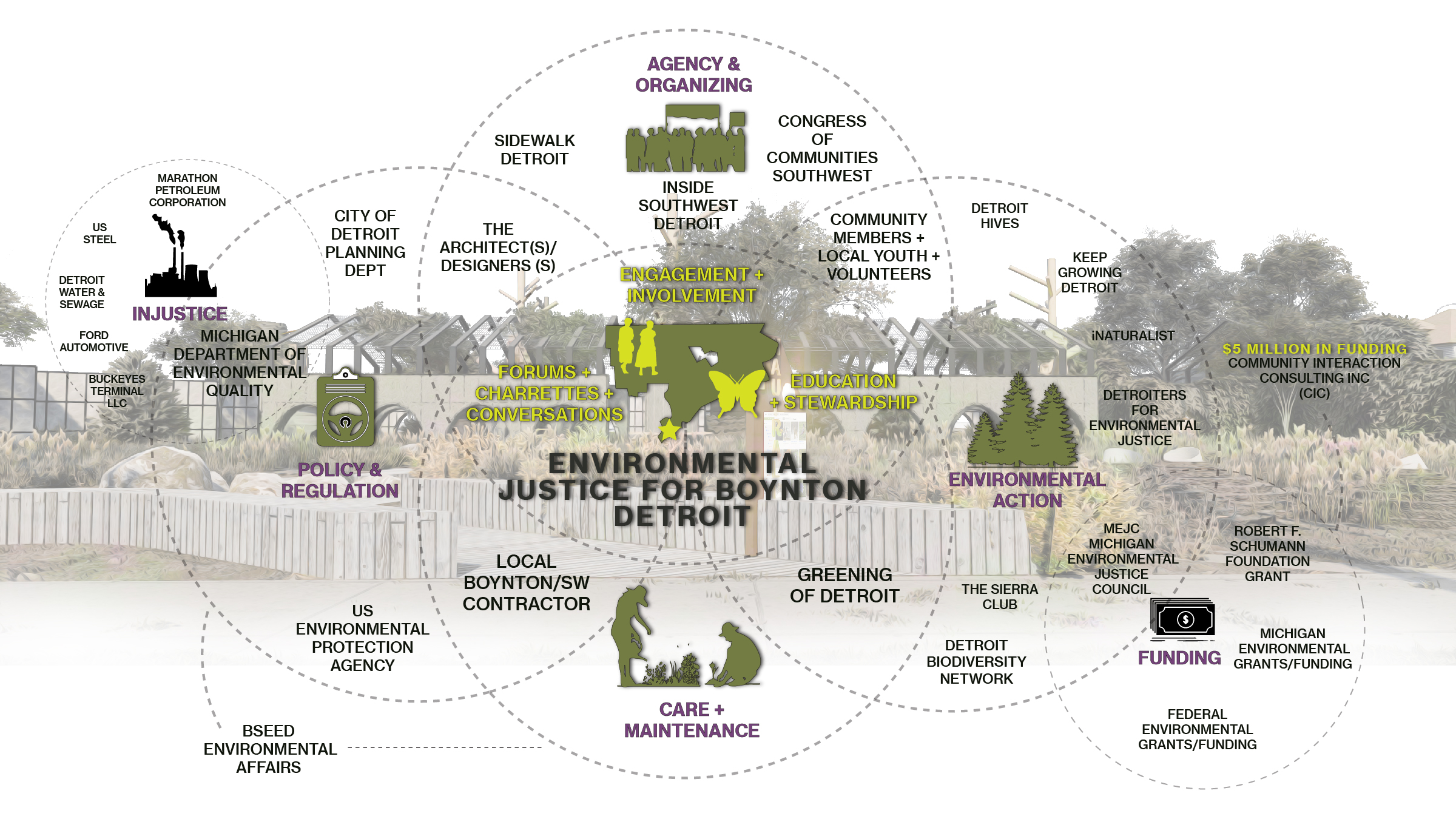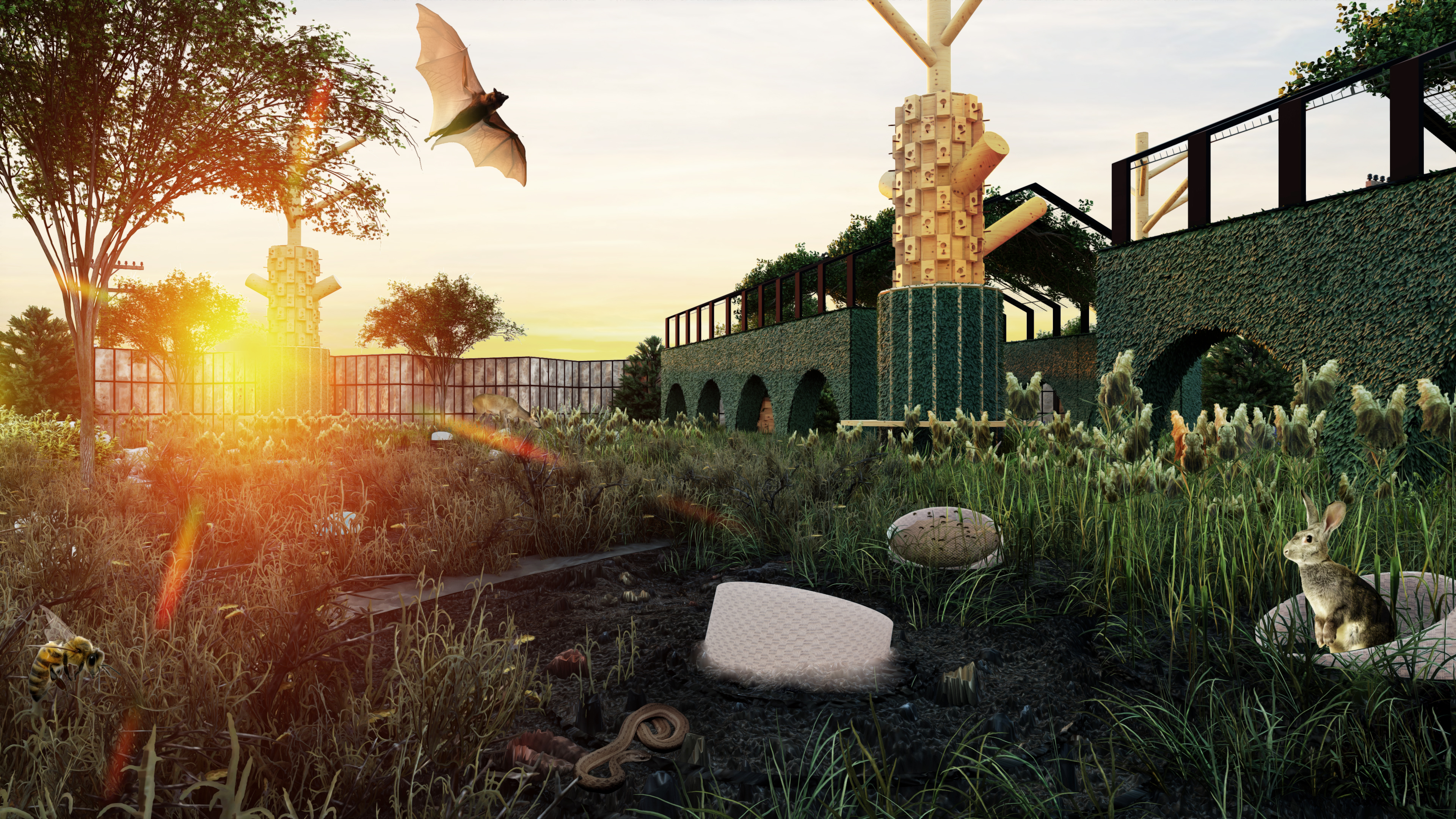
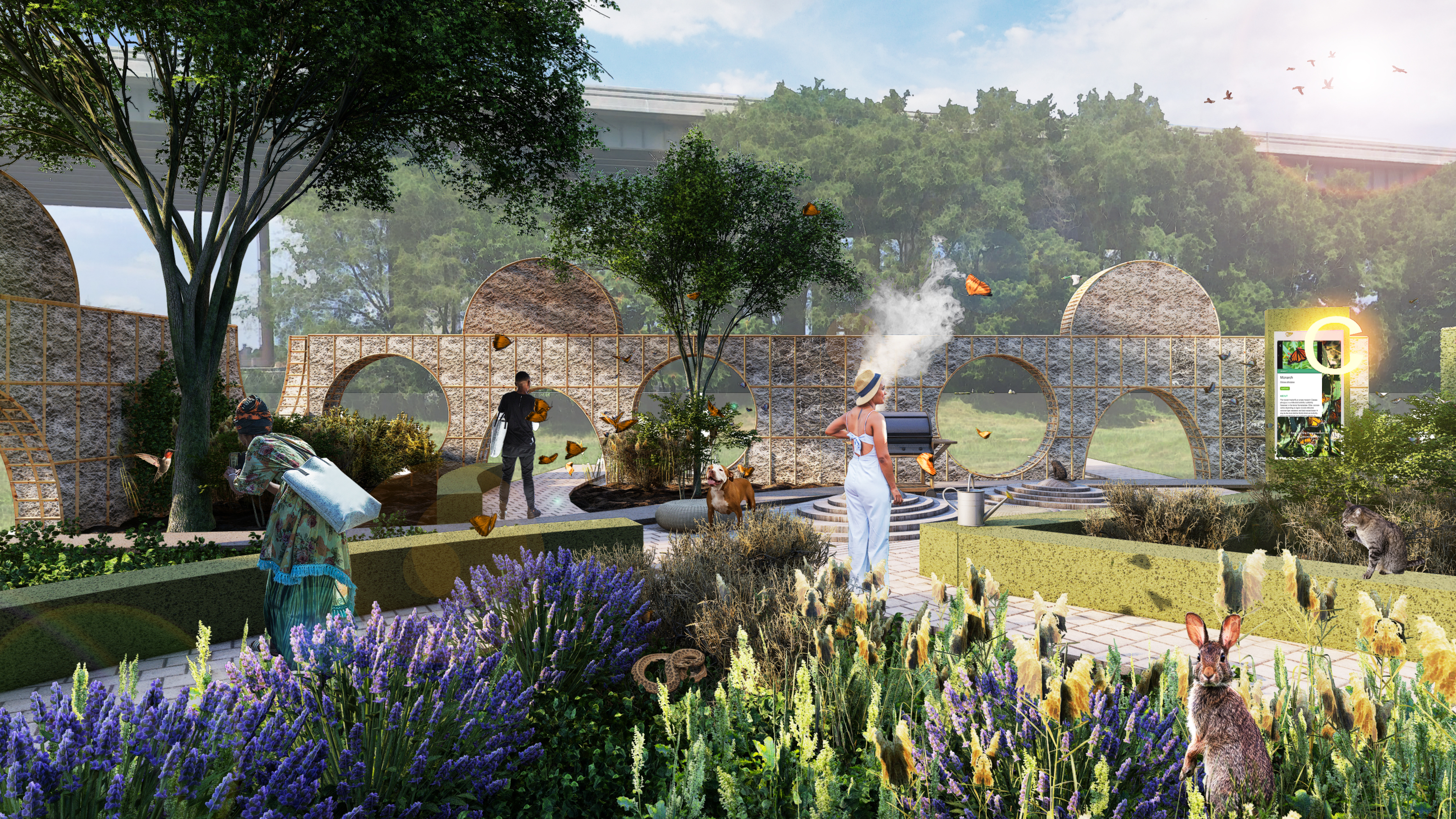
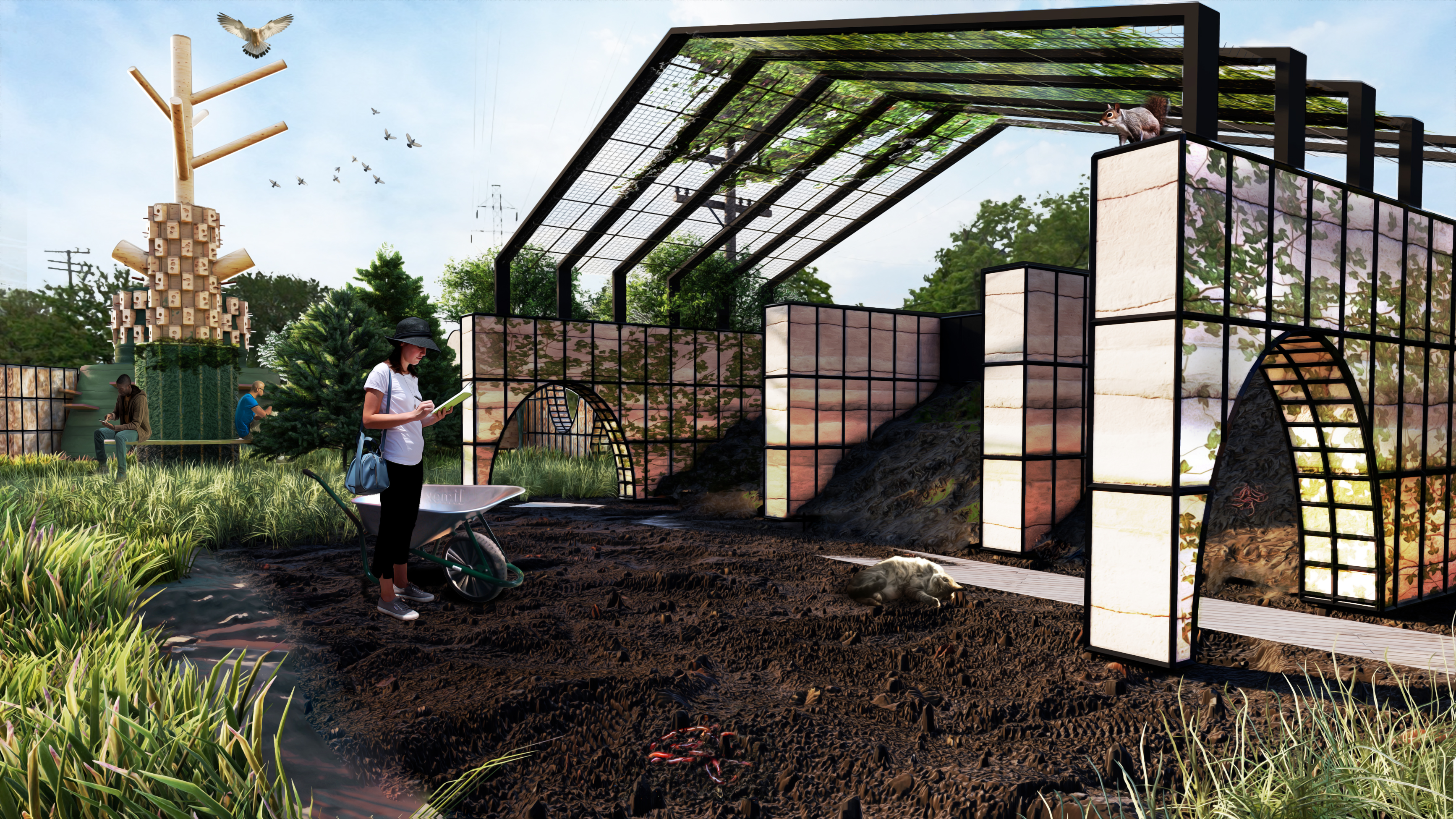
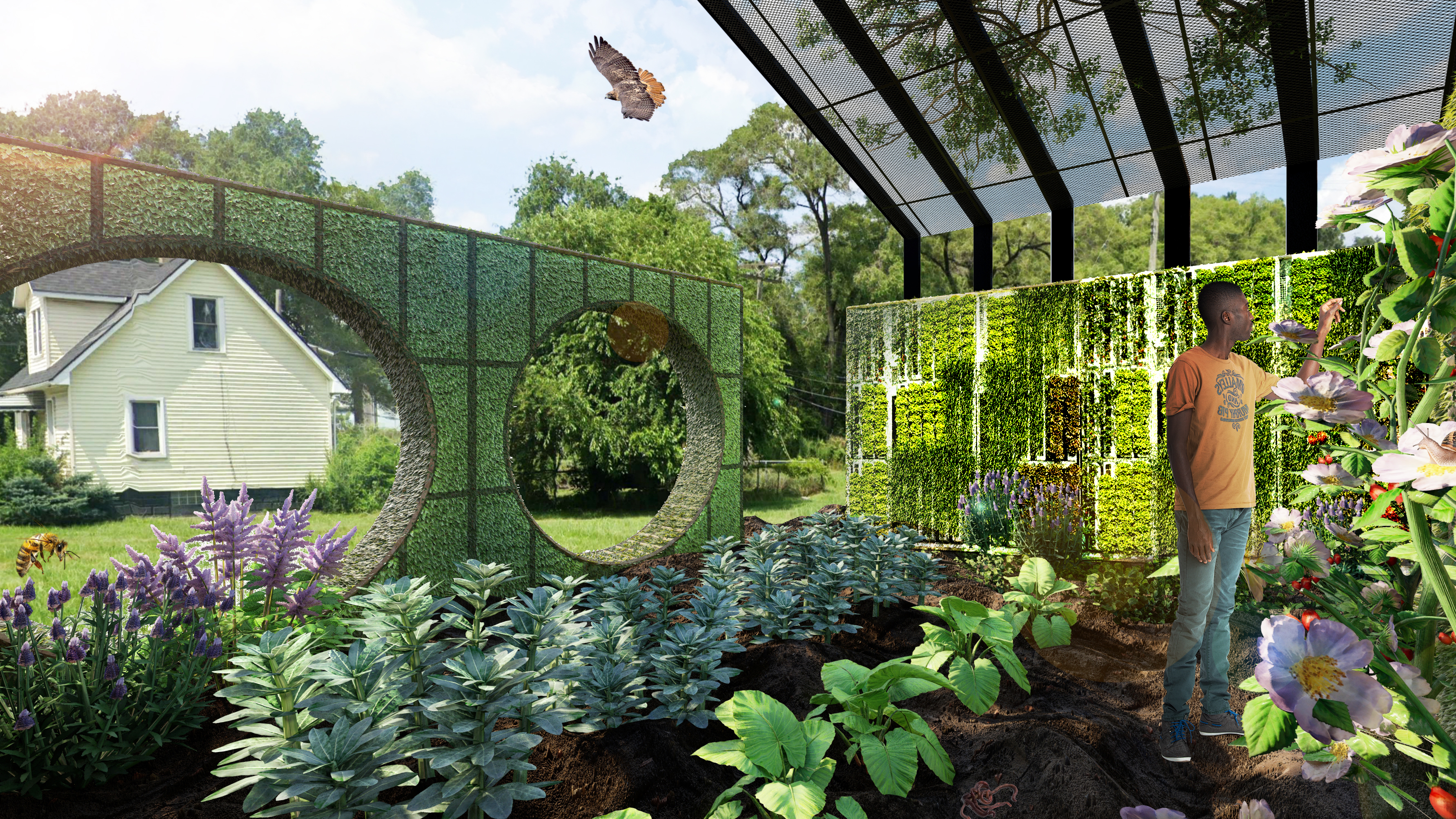

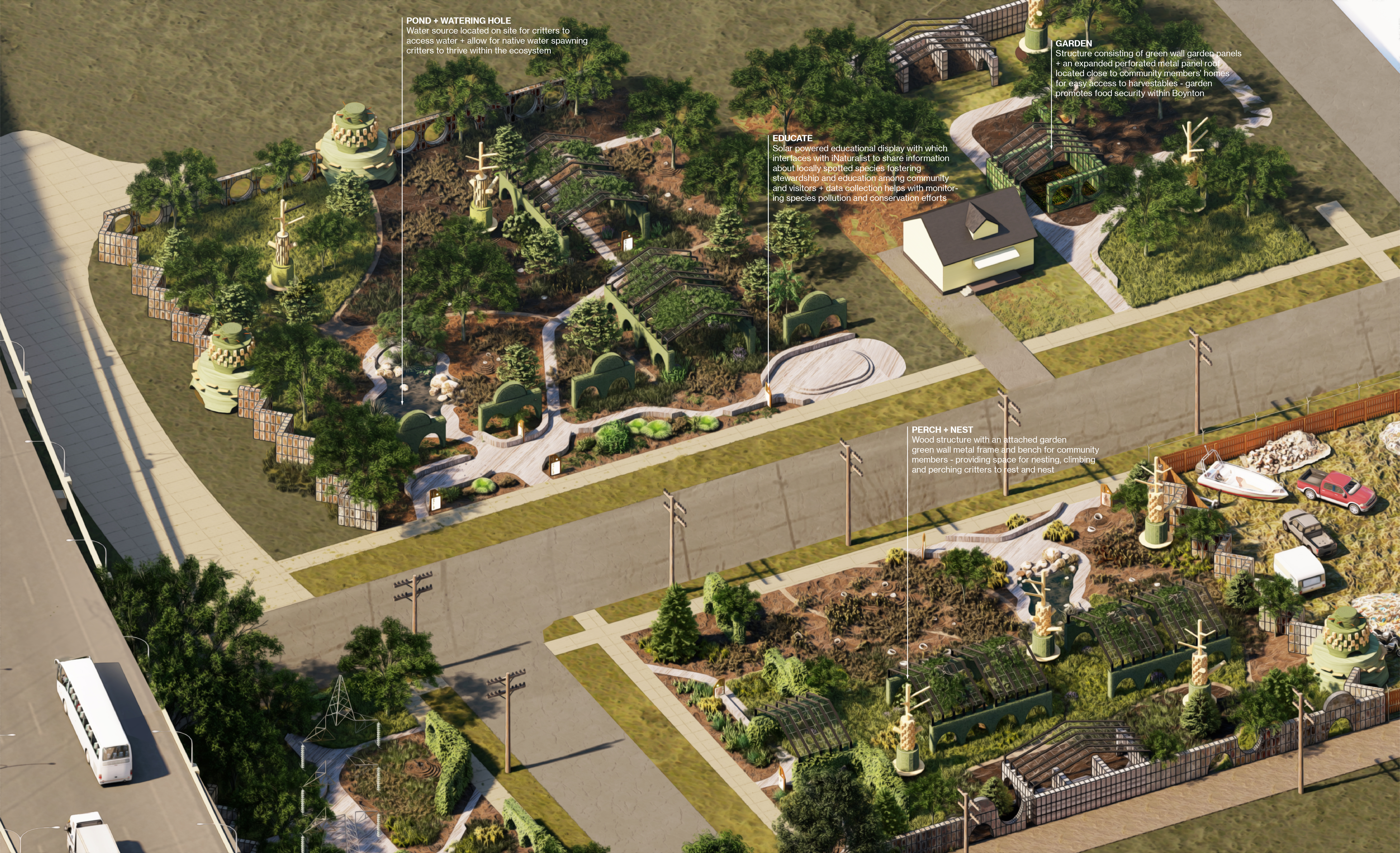

Equitable Landscapes
Detroit, MI
Masterplan | Landscape | Urban Design | Participatory Design | Habitecture
Equitable Landscapes is an ongoing initiative that began as a research thesis and is now evolving into a tangible project in Detroit, aimed at transforming vacant land into dynamic, community-driven spaces. Rooted in the belief that ecological design and social equity go hand in hand, this project explores how neglected urban areas can be revitalized through innovative landscape strategies. By blending rigorous data analysis with on-the-ground collaboration, the team behind Equitable Landscapes seeks to forge a sustainable framework that benefits both the environment and the local communities who call these neighborhoods home.
Informed by extensive research on Detroit’s historical context and socio-spatial fabric, Equitable Landscapes identifies existing urban voids and transforms them into multipurpose sites for ecological regeneration, public engagement, and cultural expression. Each intervention is rooted in local knowledge—from neighborhood associations to activists and residents—and is guided by ongoing data collection. This emphasis on community input ensures that design solutions are not only visually compelling but also tailored to the unique challenges of Detroit’s landscape, such as soil remediation, stormwater management, and long-term site maintenance.
Central to the project’s methodology is its iterative design process, which involves prototyping small-scale interventions before rolling out larger applications. Through digital modeling, material exploration, and field testing, the team refines designs that incorporate native plant species, green infrastructure, and pedestrian-friendly circulation. In addition to ecological stewardship, the prototypes also serve as powerful community assets, offering safe gathering spaces, educational resources, and opportunities for residents to connect with the land and with one another. These community-led prototypes bridge the gap between experimental design concepts and daily life, illustrating how underutilized land can be reclaimed for collective benefit.
Another key feature is the project’s commitment to transparency and knowledge-sharing. Equitable Landscapes employs interactive “field kits,” which provide detailed instructions, diagrams, and baseline data—enabling local partners to replicate and adapt successful strategies in other parts of the city. This open-source model not only amplifies the project’s impact but also fosters collaboration among design professionals, grassroots organizations, and city officials. By weaving together diverse perspectives, Equitable Landscapes champions an inclusive design philosophy that empowers neighborhoods to shape their own futures.
Ultimately, Equitable Landscapes represents a paradigm shift in how we think about vacant land and community engagement. It challenges the notion that vacant lots are merely problems to be fixed, offering a vision of these sites as laboratories for social innovation and resilience. By coupling evidence-based strategies with hands-on community leadership, the project underscores the idea that true sustainability emerges when design solutions honor local history, prioritize ecological balance, and center on the people who stand to benefit most.
As this effort continues to grow, Equitable Landscapes invites new collaborations with architects, designers, civic leaders, and community stakeholders. The project’s holistic approach—combining research, design experimentation, and local stewardship—serves as a scalable model for other post-industrial cities grappling with vacant land. In Detroit and beyond, Equitable Landscapes illustrates how thoughtful, inclusive design can foster environments that are not only greener and healthier, but also more equitable and cohesive for the communities they serve.
Detroit, MI
Masterplan | Landscape | Urban Design | Participatory Design | Habitecture
Equitable Landscapes is an ongoing initiative that began as a research thesis and is now evolving into a tangible project in Detroit, aimed at transforming vacant land into dynamic, community-driven spaces. Rooted in the belief that ecological design and social equity go hand in hand, this project explores how neglected urban areas can be revitalized through innovative landscape strategies. By blending rigorous data analysis with on-the-ground collaboration, the team behind Equitable Landscapes seeks to forge a sustainable framework that benefits both the environment and the local communities who call these neighborhoods home.
Informed by extensive research on Detroit’s historical context and socio-spatial fabric, Equitable Landscapes identifies existing urban voids and transforms them into multipurpose sites for ecological regeneration, public engagement, and cultural expression. Each intervention is rooted in local knowledge—from neighborhood associations to activists and residents—and is guided by ongoing data collection. This emphasis on community input ensures that design solutions are not only visually compelling but also tailored to the unique challenges of Detroit’s landscape, such as soil remediation, stormwater management, and long-term site maintenance.
Central to the project’s methodology is its iterative design process, which involves prototyping small-scale interventions before rolling out larger applications. Through digital modeling, material exploration, and field testing, the team refines designs that incorporate native plant species, green infrastructure, and pedestrian-friendly circulation. In addition to ecological stewardship, the prototypes also serve as powerful community assets, offering safe gathering spaces, educational resources, and opportunities for residents to connect with the land and with one another. These community-led prototypes bridge the gap between experimental design concepts and daily life, illustrating how underutilized land can be reclaimed for collective benefit.
Another key feature is the project’s commitment to transparency and knowledge-sharing. Equitable Landscapes employs interactive “field kits,” which provide detailed instructions, diagrams, and baseline data—enabling local partners to replicate and adapt successful strategies in other parts of the city. This open-source model not only amplifies the project’s impact but also fosters collaboration among design professionals, grassroots organizations, and city officials. By weaving together diverse perspectives, Equitable Landscapes champions an inclusive design philosophy that empowers neighborhoods to shape their own futures.
Ultimately, Equitable Landscapes represents a paradigm shift in how we think about vacant land and community engagement. It challenges the notion that vacant lots are merely problems to be fixed, offering a vision of these sites as laboratories for social innovation and resilience. By coupling evidence-based strategies with hands-on community leadership, the project underscores the idea that true sustainability emerges when design solutions honor local history, prioritize ecological balance, and center on the people who stand to benefit most.
As this effort continues to grow, Equitable Landscapes invites new collaborations with architects, designers, civic leaders, and community stakeholders. The project’s holistic approach—combining research, design experimentation, and local stewardship—serves as a scalable model for other post-industrial cities grappling with vacant land. In Detroit and beyond, Equitable Landscapes illustrates how thoughtful, inclusive design can foster environments that are not only greener and healthier, but also more equitable and cohesive for the communities they serve.

